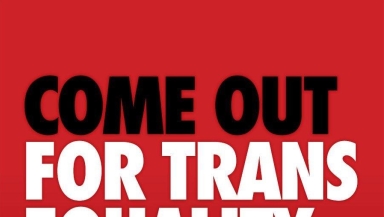
It is hard to assess how much public support there actually is in the UK for that seemingly-ubiquitous organisation, Stonewall.
According to polling organisation YouGov, 59% of people of an unspecified sample have even heard of it – of whom 30% liked them, 9% disliked them, and 20% were neutral. It is ranked as the 104th most popular charity and organisation in the UK, YouGov says (with the British Heart Foundation at the top).
But those figures date from June 2020, and rather a lot has happened since then – and especially recently. Last Friday, it emerged that Stonewall had received almost £600,000 from the Department for Education over the past five years - and a survey of 500 readers of The Times found that 96% thought this was a bad idea.
And over the last year or so, quite a few well-known employers have ended their partnership with the organisation. Those include Channel 4, Ofsted, the Cabinet Office, the Equality and Human Rights Commission and, last week, the Department of Health. A report for the University of Essex concluded that Stonewall had given misleading advice.
The main issue underlying all this, of course, is Stonewall's belief that the ideology of self-declared 'gender identity' should be able to trump the physical fact of biological sex, meaning that you can be a 'woman' with a penis or a 'man' with a womb. Professor Kathleen Stock, a philosophy professor who resigned from the University of Sussex after being persecuted for her views on these things, said in June that through its 'Diversity Champions' scheme, Stonewall had "made the whole discourse incredibly toxic, given its enormous reach within national institutions".
Stonewall says that it stands for "lesbian, gay, bi, trans, queer, questioning and ace (LGBTQ+) people" everywhere. (Ace, perhaps a less familiar abbreviation to some, is short for 'asexual', or having no sexual attraction to others). Needless to say, it does not speak for same-sex attracted Christians, such as Living Out, who follow traditional Biblical teaching and choose to be celibate!
But nor does it speak for others, either: many sexually-active gay and lesbian people have also voiced concern, reacting against Stonewall by forming the LGB Alliance, committed to "freedom of speech and biological definitions of sex". Co-founder Bev Jackson has claimed that lesbians might become "extinct" because of the emphasis from Stonewall and others on "becoming trans". She said: "If you do not accept that everyone has a gender identity, then you are automatically labelled transphobic, which means you can no longer discuss women's lives and what's happening to lesbians."
Many women also feel that Stonewall's emphasis on 'trans rights' tramples on their rights – and their personal safety. As Suzanne Moore wrote: "Can men be considered women just because they feel like it? Can men be lesbians? Can men go into women's spaces?" Earlier this month, for example, it emerged that NHS trusts have a policy of putting men on women's wards, provided they "identify" as women – even if the man in question is a sex offender, and even if they have not had sex-change surgery or taken hormones. And a rapist identifying as a woman was placed in a women's prison and sexually assaulted two female prisoners.
The science, of course, is clear. As Lord Winston, the famous biologist and professor of science and society, said recently: "I will say this categorically – that you cannot change your sex; your sex actually is there in every single cell in the body."
The human rights situation is also clear. As Baroness Falkner, the chair of the Equality and Human Rights Commission, said earlier this year, the right to question or even reject "gender identity" is "an entirely reasonable belief".
However, despite widespread public concern, and the severing of links between some employers and Stonewall, the DfE is just one of 14 government departments which have a contractual relationship with the group. And Stonewall itself says it works with "over 900 leading organisations" across the UK and around the world. The Times has described it as an "ideological bully" and declared that "its grip over others must now be broken".
One way to do this could be through a public inquiry. According to the Institute for Government, the only justification required for one is the existence of "public concern". Well, there's plenty of that. It could examine how one contentious and oppressive ideology has been so widely forced on government departments and other organisations in contravention both of biology and human rights. It could find out how much has been spent, and by whom.
Trans issues do require sensitive discussion, as I have written previously and as one former transgender Christian has movingly described here. But Stonewall's ideological dogmatism is detached from reality and its Maoist-style zeal is counter-productive. A public inquiry must be held to find out how it gained such reach, and to disentangle national life from its blinkered obsessions.
David Baker is Contributing Editor to Christian Today and Senior Editor of Evangelicals Now www.e-n.org.ukin print and online. He writes here in a purely personal capacity.













